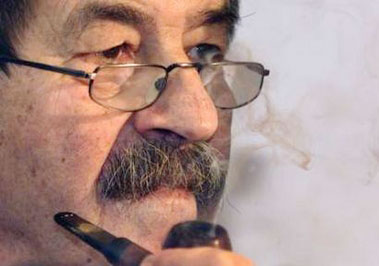Nobel prize winner Grass admits serving in Nazi SS
(Reuters)
Updated: 2006-08-12 09:53
BERLIN - Nobel prize-winning German author Guenter Grass has admitted
for the first time that he served in the Waffen-SS, Adolf Hitler's elite Nazi
troops.
In an interview with the Frankfurter Allgemeine Zeitung, Grass, 78, said he
volunteered for submarine service toward the end of World War Two. He was called
up instead to serve in the Waffen-SS in the eastern city of Dresden.

German writer Guenther
Grass, winner of the Noble prize in literature 1999, smokes his pipe
during a news conferencein Frankfurt, in this October 15, 1999. Noble
prize-winning German author Guenther Grass has admitted for the first time
August 11, 2006, that he served in the Waffen-SS, the combat arm of the
Nazi paramilitary group headed by SS chief Heinrich Himmler.
[Reuters] |
The author, best known for his
first novel "The Tin Drum" and an active supporter of Germany's Social
Democratic Party (SPD), said his wartime secret had been weighing on his mind
and was one of the reasons he wrote a book of recollections which details his
war service. The book is out in September.
"My silence through all these years is one of the reasons why I wrote
this book," the paper quoted Grass as saying in a preview of its Saturday
edition. "It had to come out finally."
One of the most powerful organizations in Nazi Germany, the SS played a key
role in the Holocaust, establishing and operating the death camps in which
millions died.
The Waffen-SS grew into a force of 38 combat divisions with almost one
million men and it was condemned as part of a criminal organization at the
post-war Nuremberg trials.
Grass was wounded in 1945 and sent to an American prisoner of war camp and
later became a prominent peace activist. He said he had volunteered for army
service as a way of breaking away from home and family.
"For me it was primarily about getting out of there. Out of that corner, away
from my family," he told the paper.
"I wanted to put an end to that and that's why I volunteered for the army.
"It was like that for many of my generation," he added. "We were doing army
service and then suddenly, one year later, the draft order was on the table. And
then I realized, probably not until I was in Dresden, that it was the
Waffen-SS."
Grass won the Nobel Prize for Literature in 1999. He is viewed as part of the
artistic movement known in German as "Vergangenheitsbewaeltigung" or "coming to
terms with the past."
Grass opposed the reunifaction of Germany in 1990, arguing that the country
would be in danger of reverting to its role as a war-mongerer.
|